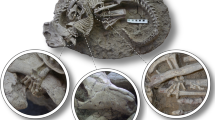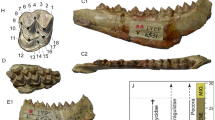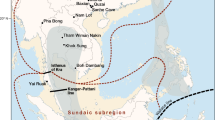Abstract
The record of Cretaceous mammals in particular and Mesozoic mammals in general is biased in favour of the Laurasian landmass1. There are relatively few reports of these mammals from the southern continents representing Gondwanaland, and most of these are confined to northwestern South America2,3. Here we report the discovery of a new eutherian mammal from the uppermost Maas-trichtian sediments intercalated in a volcanic sequence in Naskal, Andhra Pradesh, India. This first record of a south-Asian Cretaceous mammal indicates a wide distribution of these creatures and suggests that the Indian plate was not isolated from northern continents depsite the geological evidence. Our finds may also contribute to the understanding of the origin and evolution of therian mammals from mammal-like reptiles (therapsids) which are well known from the southern continents4.
This is a preview of subscription content, access via your institution
Access options
Subscribe to this journal
Receive 51 print issues and online access
$199.00 per year
only $3.90 per issue
Buy this article
- Purchase on Springer Link
- Instant access to full article PDF
Prices may be subject to local taxes which are calculated during checkout
Similar content being viewed by others
References
Clemens, W. A., Lillegraven, J. A. & Lindsay, E. H. in Mesozoic Mammals 7–58 (University of California Press, 1979).
Sige, B. C.r. Acad. Sci. 273, 2479–2481 (1971).
De Muizon, C. et al. Geobios 16, 747–753 (1983).
Chatterjee, S. & Hotton, N. J. Southeast Asian Earth Sci. 1, 145–189 (1986).
Sahni, A. et al. Bull. Soc. Geol. France 24, 1093–1099 (1982).
Gayet, M., Rage, J. C. & Rana, R. S. Mem. Geol. Soc. France N.S. 147, 55–65 (1984).
Besse, J. et al. Proc. Ist Int. Meet. IGCP Project 216: Global Biological Events in Earth History, 365–370 (1986).
Prasad, G. V. R., Sahni, A. & Gupta, V. J. Geoscience J. 7, 163–180 (1986).
Courtillot, V. et al. Earth planet. Sci. Lett. 80, 361–374 (1986).
Sahni, A. Science 226, 441–443 (1984).
Lydekker, R. Rec. geol. Surv. India 23, 20–22 (1890).
Rao, B. R. J. & Yadagiri, P. Mem. Geol. Soc. India 3, 287–291 (1981).
Sahni, A., Rana, R. S. & Prasad, G. V. R. J. pal. Soc. India 29, 26–33 (1984).
Capetta, H. et al. Geobios 11, 257–263 (1978).
Van Valen, L. & Sloan, R. E. Nature 270, 193 (1977).
Prakash, U. J. Paleont. 34, 1027–1040 (1960).
Srivastava, S. K. Proc. Symp. on Cretaceous of India (Birbal Sahni Institute of Palaeobotany, 1983), 141–157.
Bande, M. B., Mehrotra, R. C. & Prakash, U. The Palaeohotanist 35, 1–12 (1986).
Author information
Authors and Affiliations
Rights and permissions
About this article
Cite this article
Prasad, G., Sahni, A. First Cretaceous mammal from India. Nature 332, 638–640 (1988). https://doi.org/10.1038/332638a0
Received:
Accepted:
Issue Date:
DOI: https://doi.org/10.1038/332638a0
This article is cited by
-
An Eocene Greenhouse Forested India: Were Biotic Radiations Triggered by Early Palaeogene Thermal Events?
Journal of the Geological Society of India (2022)
-
The Charm of Paleontology
Journal of the Geological Society of India (2021)
-
New microhylid frog genus from Peninsular India with Southeast Asian affinity suggests multiple Cenozoic biotic exchanges between India and Eurasia
Scientific Reports (2019)
-
A troodontid dinosaur from the latest Cretaceous of India
Nature Communications (2013)
Comments
By submitting a comment you agree to abide by our Terms and Community Guidelines. If you find something abusive or that does not comply with our terms or guidelines please flag it as inappropriate.



